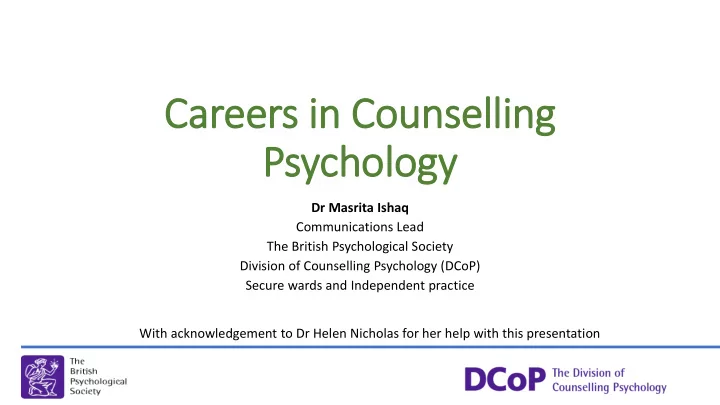

Careers in Counselling Psychology Dr Masrita Ishaq Communications Lead The British Psychological Society Division of Counselling Psychology (DCoP) Secure wards and Independent practice With acknowledgement to Dr Helen Nicholas for her help with this presentation
What is Counselling Psychology? • Branch of applied psychology • Influences: humanistic philosophy, human science research, phenomenology, critical social science, anti-psychiatry, main psychotherapeutic traditions • Roots: Humanistic, Holistic and Relational
Why counselling psychology Special acknowledgement and thanks to Dr Daisy Best, past Training Lead • https://www.youtube.com/watch?v=JcDKz5J-90s&t=1s for producing these videos Dr Maureen McIntosh- Chair of DCoP & Senior Counselling Psychologist https://www.youtube.com/watch?v=1ujMSKSQRxs Tasim Martin-Berg- Deputy Programme Leader at Glasgow Caledonian University & Independent Practitoner https://www.youtube.com/watch?v=cMI1AtzTu6c Professor Mick Cooper- University of Roehampton https://www.youtube.com/watch?v=Iw5Ng4GuGPs Dr Mark Bradley- Consultant Counselling Psychologist (CAMHS) & Independent Practitioner https://www.youtube.com/watch?v=cqSUabZl7Qs Dr Hamilton Fairfax- Professional Lead (Secondary mental health) & Counselling Psychologist, & Research Lead DCoP https://www.youtube.com/watch?v=Br7QkRs4RU4 Nicola Massie- Chair of DCoP Wales https://www.youtube.com/watch?v=JU1ynRU1Ndk&t=1s
Where do Counselling Psychologists work? NHS Independent Practice Voluntary sectors -IAPT Private Hospitals -Community Mental Health Teams Charitable Organisations -CAMHS Education -Older adult services Universities -Specialist teams Military -Family proceedings Forensic Settings Court
Survey of f Employment Status Name Percentage Adult services 73.4% Community Mental Health Teams 36.4% Crisis Resolution & Home Treatment services 2.8% Employment of counselling psychologists Assertive Outreach teams 0.7% in NHS provided or NHS commissioned Liaison Psychiatry teams 2.8% services Early Intervention for Psychosis services 4.9% Rehabilitation and recovery teams 7.7% In these services 54.2% work full time and a IAPT – Improving access to Psychological Therapy 25.9% further 39.6% 0.5wte or more. 31.5% have given 10 years or more of service, with a further 21.7% Child & Adolescent Services 16.1% 6-10 years, so retention is good. IAPT for children and young people 2.8% The percentages of qualified counselling Perinatal mental health services 2.1% psychologists in public and third (voluntary) Forensic services 9.1% sector services have been estimated from a Learning Disability services 7.0% member survey by the BPS Division of Counselling Older adult services 6.3% Psychology (June 2016). Memory services 0.7% Substance Misuse services 8.4% Physical Health Psychology services 16.1% Sexual Health 4.2% Eating Disorder services 10.5%
Survey of f Employment Status Name Percentage Employment of counselling psychologists in voluntary sector mental health provision Children and schools 24.2% In these services 30.8% work full time and more work Couple and family 19.4% part time which may reflect both portfolio careers and Adult mental health 71.0% the nature of funding and employment patterns in this sector, with 53.7% working less than 0.5wte. Still, Forensic settings 4.8% 15.4% have given 10 years or more of service, with a Services for particular populations, e.g. women's services, LGBT services, 37.1% further 16.9% 6-10 years. BAME services, veterans, older adults, bereavement The percentages of qualified counselling psychologists in public and third (voluntary) sector services have been estimated from a member survey by the BPS Division of Counselling Psychology (June 2016).
What do Counselling Psychologist do? • Carry out holistic assessments and case formulations • Work with individual’s unique subjective psychological experience • Use diverse range of therapeutic knowledge frameworks and models • Leadership • Supervising, mentoring • Consulting • Training- university or independent practice
Core Principles of f Counselling Psychologists • Engaging with subjectivity and intersubjectivity- values and beliefs • Empathic knowing and respecting first-person accounts as valid in their own terms • Not assuming the automatic superiority of any one way of experiencing • Recognising social contexts and discrimination; empowering rather than controlling, demonstrating high standards of anti-discriminatory practice • Commitment to reflective practitioner model- The therapeutic use of self • Using a humanistic and relational value base
Research & Academia in Counselling Psychology • Academia https://www.youtube.com/watch?v=Iw5Ng4GuGPs&t=14s
Division of f Counselling Psychology Values Work ethically and effectively. Be reflective scientist-practitioners. Work creatively, compassionately and collaboratively. Vision Meeting the psychological needs of people. Equality of access to resources, research, education and training. Fairness, equality and social justice. Leading and influencing the design and delivery of innovative policies and services.
Publications
Doctoral training (PsychD)- Accredited Courses 2017 England England Scotland University of Surrey University of Wolverhampton University of Roehampton University of Strathclyde Metanoia Institute University of the West of England New School of Psychotherapy & Counselling Regents University University of Manchester City University Glasgow Caledonian University London Metropolitan University Teeside University University of East London https://beta.bps.org.uk/public/become-psychologist/accredited-courses
In Independent route- BPS Qualification in Counselling Psychology (QCoP) • More autonomous, self driven • Identify a willing Coordinating Supervisor (CS) • AEC- Accreditation of Existing Competence • Plan training • Submit • Approve by Registrar of the QCoP • Do not result in a doctorate Both are to Doctoral level
What programmes look for? • Evidence of academic ability to succeed at doctoral programme • Graduate Basis for Chartership (GBC), evidence from BPS that verifies this • Ability to undertake research at doctoral level- • Evidence of right kind of relevant clinical experience • Evidence of interpersonal skills and reflective abilities- examined more at interview • Many course require you to have undertaken some kind of formal training counselling skills training
What to consider when making your choice?
Challenges • Financial – fees, private therapy; Doctorate loans • Placement • Recognition in employment settings • Uncomfortable fit with medical model of mental illness more so in some settings. Navigate through it. Learn through the challenges
References and Helpful resources How to become a counselling psychologist (2017) by Dr Elaine Kasket Handbook of Counselling Psychology 3 rd ed. Edited by Ray Woolfe, Sheelagh Strawbridge, Barbara Douglas and Windy Dryden
Fin ind us on: @ www.bps.org.uk/dcop @dcopuk https://www.facebook.com/divisionofcounsellingpsychology/ Feel free to email me at dcopcommslead@bps.org.uk
Recommend
More recommend